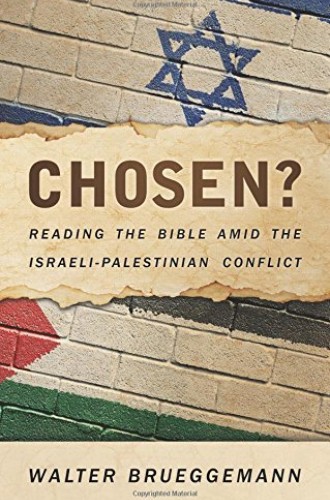Chosen? by Walter Brueggemann
"Do not cross this meadow unless you can do it in nine seconds; the bull can do it in ten.” This apocryphal sign on a British footpath captures something of the risk Walter Brueggemann takes in traversing the terrain of the Israeli-Palestinian conflict in so few pages. This readable book is a layperson’s introduction to the hermeneutical issues involved in using the Bible to make sense of tension in the Near East. Theological ambiguities about the status of Israel that Brueggemann identifies will leave some readers unsettled, but the way he frames questions and draws on scripture makes this an excellent resource for the church. Pounding hooves will be in hot pursuit.
The pursuing bulls in the Western church today include a boycott, divestment, and sanctions movement directed against Israel because of settlements in the West Bank. They also include Christians United for Israel, which seems ready to endorse anything Israel wants. Brueggemann mentions neither; rather, he invites us to stand back and consider underlying biblical polarities that should frame our thinking.
Read our latest issue or browse back issues.
As a frequent traveler to Israel-Palestine, I welcome this volume because of inner turmoil I always feel in the Holy Land. The unimaginable suffering of the Jewish people, especially in the 20th century, makes me grateful that Jews have security in their homeland. I feed on the Hebrew scriptures. But it is painful to watch Jewish people, whose spiritual and cultural heritage I honor, systematically deprive Palestinians of what seems to be their rightful territory in the West Bank.
The title of this book is a question: Chosen? Are the Jewish people of Israel still God’s elect, the chosen ones of Genesis to whom Yahweh promised the land in eternal covenant? Unwilling to draw a direct line from biblical text to modern application, Brueggemann gives a nuanced answer. He says that 21st-century Israel is a far cry from the sojourning family of Abram, from the band of escaped slaves at Sinai, and from exiles in Babylon. Still, Israel is God’s chosen people, and “the Bible makes no sense without this claim.” But there’s more to it than that.
The founding of the modern state of Israel in 1948 came on the heels of the Holocaust. The Jews of 1948 were again a sojourning and vulnerable people, valiantly returning to their homeland for refuge. Today’s Israel, in contrast, is a nuclear power supported by massive American military aid. Israel is no longer pretending to function as a people bound by covenant to Yahweh and the Torah. We cannot simply equate this largely secular society with the chosen people of the Bible and thus apply ancient promises.
Even if we could equate the modern state with the chosen people of the Old Testament, Brueggemann shows that promises made to Israel are conditional. The land, he says, “is given to Israel unconditionally, but it is held by Israel conditionally.” There are competing voices within scripture about the covenantal status of the real estate. On one hand, God unilaterally gave the land to Abram and his descendants. On the other, Moses, Joshua, and the prophets repeatedly put conditions on their keeping the land. “If you transgress the covenant of the Lord,” Joshua says, “you shall perish quickly from the good land that he has given you.” We must hold promise and conditions together in assessing how much to endorse or support the modern state.
Brueggemann repeatedly warns against “ideology,” by which he means inflexible views or policies that remain unchanged by attempts at persuasion or by “new facts on the ground.” Much of Christian Zionism, he says, embodies this kind of uncritical approach—trying to make policy out of select biblical texts while simply repeating tired mantras. The evangelical community, he complains, too often gives Israel a blank check without taking into account new information, such as the suffering of Palestinian people. Such an ideological reading of the Bible often mistakenly places the modern state into a millennial schema imposed on the scriptures.
“Such one-sided and unconditional support for the state of Israel is not finally in the interests of any party,” Brueggemann says, “for peace will come only with the legitimation” of both contending peoples. Persuaded that Israel will never allow a viable Palestinian state, Brueggemann abandons hope for a two-state solution. Peace might finally come, he speculates, through a one-state scenario “that insists upon well-protected human rights for Palestinians while the Israeli occupation is fully recognized.” Such a solution would require “even-handed engagement by the Great Powers” and courage on all sides. (Prepare for bulls charging from the left at any suggestion that Israel will gain permanent sovereignty of Greater Israel, including the West Bank.)
Regardless of how attempted solutions unfold, Christians must be “zealous, relentless advocates for human rights,” Brueggemann says, ready to blow the whistle on any party that abuses power. While acknowledging Israel’s legitimate need for security, Christians must not give protection or support to “neighborhood bullies.” And Christians themselves must not become bullies. Specifically, we must not slip into supersessionism, the belief that the church inherits covenantal promises by simply replacing Israel in the divine plan.
Brueggemann acknowledges that much of the New Testament and a lot of hymnody seem to teach supersessionism, but in this little volume he does not present a hermeneutic to address that problem. Americans sometimes view themselves as chosen people and heirs to their own Promised Land. When Christians align this dangerous ideology with unqualified support for Israel, Brueggemann states, foreign policy becomes toxic. (Prepare for bulls charging from the right at the idea that the New Testament gets it wrong by advancing supersessionist doctrine.)
Although he occasionally lapses into theological jargon in this book, Brueggemann mostly writes in language that is accessible to nonspecialists. Occasional sidebars explain concepts such as multiple authorship of biblical books and historical events such as the exile. A brief glossary defines words such as eschatology and Shoah. A 20-page study guide in the appendix, prepared by David Maxwell, offers structure for adult classes to engage with and discuss Brueggemann’s arguments in four sessions. There even are “Guidelines for respectful dialogue” from the Presbyterian General Assembly. These admonish study group participants to “focus on ideas and suggestions instead of questioning people’s motives, intelligence, or integrity.” That advice will come in handy when the bulls charge.






